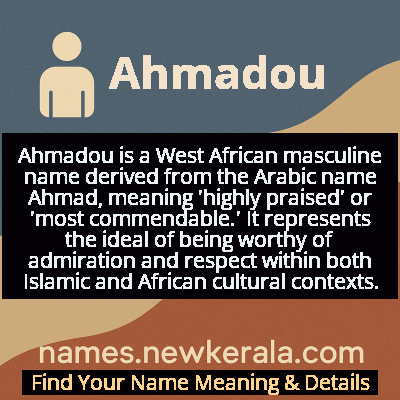Ahmadou Name Meaning & Details
Origin, Popularity, Numerology Analysis & Name Meaning of Ahmadou
Discover the origin, meaning, and cultural significance of the name AHMADOU. Delve into its historical roots and explore the lasting impact it has had on communities and traditions.
Name
Ahmadou
Gender
Male
Origin
African
Lucky Number
9
Meaning of the Name - Ahmadou
Ahmadou is a West African masculine name derived from the Arabic name Ahmad, meaning 'highly praised' or 'most commendable.' It represents the ideal of being worthy of admiration and respect within both Islamic and African cultural contexts.
Ahmadou - Complete Numerology Analysis
Your Numerology Number
Based on Pythagorean Numerology System
Ruling Planet
Mars
Positive Nature
Generous, passionate, energetic, and humanitarian.
Negative Traits
Impulsive, impatient, moody, and can be overly emotional.
Lucky Colours
Red, maroon, scarlet.
Lucky Days
Tuesday.
Lucky Stones
Red coral, garnet.
Harmony Numbers
1, 2, 3, 6.
Best Suited Professions
Military, sports, philanthropy, leadership roles.
What People Like About You
Courage, energy, leadership, generosity.
Famous People Named Ahmadou
Ahmadou Ahidjo
Statesman
First President of Cameroon who led the country to independence
Ahmadou Kourouma
Writer
Renowned Ivorian novelist and major figure in African literature
Ahmadou Bamba
Religious Leader
Founder of the Mouride Brotherhood in Senegal
Ahmadou Tall
Military Leader
Prominent commander of the Toucouleur Empire in West Africa
Name Variations & International Equivalents
Click on blue names to explore their detailed meanings. Gray names with will be available soon.
Cultural & Historical Significance
The name's cultural importance extends beyond religious significance to embody values of wisdom, community responsibility, and cultural preservation. In many West African societies, naming a child Ahmadou expresses hope that they will grow into a person of good character and community standing. The name serves as a cultural touchstone, connecting individuals to both their Islamic faith and their specific ethnic heritage. This dual identity makes Ahmadou particularly meaningful in contexts where African and Islamic identities intersect, representing a harmonious synthesis that has characterized much of West African history and culture.
Extended Personality Analysis
Individuals named Ahmadou are typically associated with a personality characterized by wisdom, calm authority, and strong moral principles. They are often perceived as natural leaders who command respect through their thoughtful approach and reliable character rather than through overt displays of power. The name carries expectations of intellectual depth and spiritual awareness, with many Ahmadous being seen as people who carefully consider their actions and words before speaking or acting. This contemplative nature often makes them excellent mediators and advisors in their communities.
There is also a strong association with responsibility and family devotion connected to the name Ahmadou. Those bearing this name are often expected to be pillars of their families and communities, demonstrating loyalty and commitment to collective well-being. The personality traits commonly attributed to Ahmadou include diplomatic skill, patience, and a quiet confidence that inspires trust in others. While they may not be the most flamboyant or outgoing individuals, their steady presence and reliable judgment make them valued members of any social or professional circle. These perceived traits reflect the historical figures who have borne the name and the cultural values it represents in West African societies.
Modern Usage & Popularity
In contemporary times, Ahmadou continues to be a widely used name across West Africa, maintaining its traditional appeal while adapting to modern naming trends. The name remains particularly popular in Francophone African countries like Senegal, Mali, Ivory Coast, and Cameroon, where it serves as a strong cultural identifier within Muslim communities. While its usage has become somewhat less frequent with the emergence of newer, more international naming trends, it maintains a steady presence due to its deep cultural roots and association with respected historical figures. In diaspora communities in Europe and North America, Ahmadou functions as an important cultural marker, helping families maintain connections to their West African heritage. The name's various spelling adaptations have become more common as families seek to balance tradition with contemporary preferences, ensuring its continued relevance across generations.
Symbolic & Spiritual Meanings
Symbolically, Ahmadou represents the ideal of praiseworthy character and moral excellence within West African cultural contexts. The name embodies concepts of wisdom, spiritual depth, and community leadership, serving as an aspirational title for boys expected to become respected figures in their societies. It symbolizes the harmonious blending of Islamic tradition with African cultural values, representing a bridge between religious devotion and practical community stewardship. The name also carries strong connotations of cultural resilience and identity preservation, particularly significant in diaspora contexts where it serves as a tangible connection to heritage. In many ways, Ahmadou symbolizes the enduring strength and adaptability of West African cultural and religious traditions in an increasingly globalized world, while maintaining its core associations with integrity, wisdom, and community responsibility.

